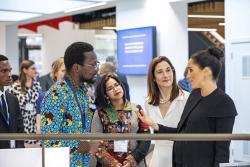Royal reception for Ephraim and his research
 Dr Ephraim Kisangani with Meghan, Duchess of Sussex at the Reception in LondonMeghan, Duchess of Sussex showed particular interest in the work of Bangor University Masters student Dr Ephraim Kisangala, a Commonwealth Scholarship student from Uganda, who she met at a London reception recently.
Dr Ephraim Kisangani with Meghan, Duchess of Sussex at the Reception in LondonMeghan, Duchess of Sussex showed particular interest in the work of Bangor University Masters student Dr Ephraim Kisangala, a Commonwealth Scholarship student from Uganda, who she met at a London reception recently.
Ephraim, a GP in Uganda who is studying Public Health and Health Promotion at Bangor University’s School of Healthcare Sciences, was invited to meet the Duchess of Sussex at an Association of Commonwealth Universities event to announce the Duchess becoming the Association’s Royal Patron.
Ephraim says: I was invited to the event and considered whether I should attend- it was only two days before that we were informed that the Duchess was to be there. I was a little nervous before hand, but discussing my work with the Chair of the Commonwealth Association of Universities calmed my nerves. I was introduced to the Duchess briefly and she asked about my research, she came across as a most humble individual, and was smiling and attentive. She later came back to me for a more in depth conversation about the problems faced by menstruating women in refugee camps in Uganda.
Ephraim said that the Duchess was very well informed about African affairs and also about the problems faced by menstruating women in India.
“The duchess said to me how shocked she was and how it was so important to raise awareness of this issue so that more can be done.”
Explaining his dissertation subject, Ephraim said that Uganda has the largest number of refugees of any African country and that menstruation is a hidden health issue for women there.
His dissertation on the topic has grown from his interest in menstruation and women’s health as an issue in Uganda.
Commenting on what he’s been learning he says: “The teaching and curriculum on my course is very flexible. This enables me to choose topics which are related to Ugandan healthcare problems. This ensures that what I learn at Bangor is particularly relevant when I return to Uganda.”
Ephraim’s dissertation supervisor, Dr Jaci Huws, a Senior Lecturer and Director of Internationalisation at the School of Healthcare Sciences said:
“Ephraim has shown a real desire to learn about sustainable programmes of health. He is passionate about improving the health and well-being of displaced people, particularly those living in rural and remote areas of the world. We are extremely proud of all his achievements.”
The visit has brought a great deal of media attention to Ephraim’s work and he has been contacted by friend and colleagues around the globe who have seen the media coverage.
He adds:
“The duchess was very passionate about our work, I could tell she had a genuine concern for the women we are trying to help.”
Having been practicing as a GP for two years, Ephraim had decided that the time was right to develop his experience and to extend his education.
Ephraim was involved in the first world campaign on menstrual hygiene management in 2014 while he was a medical student. He and a group of fellow young professionals contribute from their monthly salaries to fund visits to rural areas with no access to healthcare, to provide free healthcare services to the people in the hardest to reach areas through a local based organisation called Nyalojjie Integrated Foundation (NIF).
Dr Kisangala was nominated for his Scholarship by the Windle Trust International, a charity that promotes education among people affected by conflicts and refugees.
Here are two articles about Ephraim's previous work and campaign:
https://mhhub.org/blog/putting-the-men-menstrual-health-empathetic-reflections-from-a-son/
Publication date: 1 February 2019
